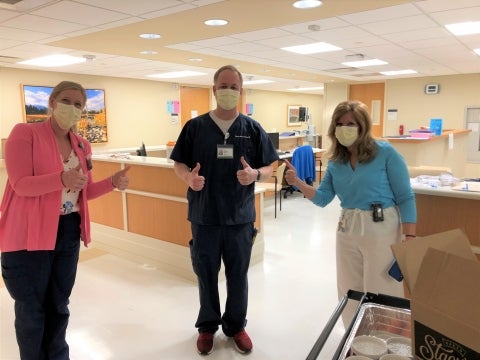
After five weeks of caring for patients in New Jersey, Travis Wehmeyer is home but exhausted.
Travis has been a nurse since 2015 after serving four years as a paramedic. Today, he is a nurse for Hillcrest HealthCare System, part of Ardent Health Services, filling in wherever needed across several of their hospitals in Oklahoma.
In late March, his supervisor inquired whether Travis might be interested in volunteering to work at a sister Ardent hospital in New Jersey, a COVID-19 hotspot. He said he would, a few days later he was presented with the opportunity to serve at Hackensack Meridian Health Pascack Valley Medical Center in Westwood.
Travis immediately completed the application but decided to sleep on it before submitting it. The next morning, he felt a calling. “I woke up knowing that was where my heart was, so I hit the send button on the application email.”
By Monday, he had his plane ticket. Travis arrived around midnight after a long 12-hour day of travel from Tulsa to Atlanta to Minneapolis to Newark, New Jersey. The following day, he reported at 6:30 AM at Pascack Valley.
He took the elevator to his assignment on the fifth floor, where he learned he would be caring for a group of patients assigned to a nurse who was going off shift. After getting that nurse’s report about each patient’s status, he dove in, as he said, “headfirst.” Travis says that the first day felt a bit chaotic, but as an experienced resource nurse, he was accustomed to ‘showing up and figuring it out.’ “I quickly found my feet and hit the ground running. I knew my job was to keep people alive,” he said.
His patients ranged from 20-somethings to seniors in their 90s. He learned quickly that patients 50 and younger tended to farewell. Patients who were chronically ill or coming from nursing homes tended to face tougher challenges.
“It was very hard on the families. In the mornings, we were incredibly busy, so we returned calls in the afternoon and evening.” He says one of the most difficult aspects of his service was caring for patients at the end of their lives, without family around them. “Death, no matter how many times you have experienced it, is always incredibly sad.”
Travis believes that he was running on pure adrenaline the first few days. After that, he said, fear was a driver. “Yes, I was fearful of getting sick 1,200 miles from home. It was probably less than a one percent chance, but it was still a possibility.”
Keeping a solid routine contributed to his sense of well-being. He focused on getting plenty of rest. One of his fondest memories was Michael, the hotel manager at his hotel. “He took care of all of the visiting nurses. He made sure we had dinner waiting when we got ‘home’ to the hotel. All of us would go home together, talk about the day, eat dinner, and go to bed.”
One big challenge was living with personal protective equipment (PPE): masks, gowns, gloves, and head and shoe coverings. “It made it hard to stay well hydrated throughout a shift,” he explained. “It was a repetitious cycle: put on PPE, take off PPE, wash hands, drink coffee, and then put it all on again.” He recalls drinking more than a few cups of room temperature coffee.
Travis was especially complimentary of the Pascack Valley leaders. “The CEO, Emily Holliman, and CNO, Sue Giordano, were so kind and attentive to us. My nursing director, Mohan Lokanadham, was fantastic. He really cares about his people.”
Asked what he would like everyone to know about his experience, Travis stated, “I did not hear one single complaint from anyone at the hospital, and they had been working like that for weeks. The nurses did their jobs and took care of patients. We all worked fluidly as a team.”
He was also moved by the outpouring of community support, from family member gratitude expressed over the phone—calling nurses their heroes—to community parades around the hospital.
Summing up his five weeks in New Jersey, Travis said, “It hits you right in your heart. It was overwhelming.”
